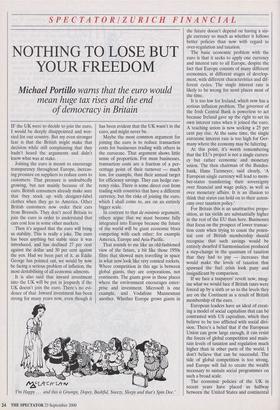SPECTATOR/ZURICH FINANCIAL
NOTHING TO LOSE BUT YOUR FREEDOM
Michael Padilla warns that the euro would
mean huge tax rises and the end of democracy in Britain
IF the UK were to decide to join the euro, I would be deeply disappointed and wor- ried for our country. But my even stronger fear is that the British might make that decision while still complaining that they hadn't heard the arguments and didn't know what was at stake.
Joining the euro is meant to encourage transparency throughout Europe, increas- ing pressure on suppliers to reduce costs to customers. That pressure is undoubtedly growing, but not mainly because of the euro. British consumers already make sure that they stock up with designer-label clothes when they go to America. Other British customers now order their cars from Brussels. They don't need Britain to join the euro in order to understand that cars cost less in some other markets.
Then it's argued that the euro will bring us stability. This is really a joke. The euro has been anything but stable since it was introduced, and has declined 27 per cent against the dollar and 30 per cent against the yen. Had we been part of it, as Eddie George has pointed out, we would by now be facing a serious problem of inflation, the most destabilising of all economic ailments.
It is also said that inward investment into the UK will be put in jeopardy if the UK doesn't join the euro. There's no evi- dence of that. Inward investment has been strong for many years now, even though it has been evident that the UK wasn't in the euro, and might never be.
Maybe the most common argument for joining the euro is to reduce transaction costs for businesses trading with others in the eurozone. That argument shows little sense of proportion. For most businesses, transaction costs are a fraction of a per- centage point of their turnover — much less, for example, than their annual target for efficiency savings. They can hedge cur- rency risks. There is some direct cost from trading with countries that have a different currency, but the risks of joining the euro, which I shall come to, are on an entirely bigger scale.
In contrast to that de minimis argument, others argue that we must become fully integrated into Europe because the future of the world will be giant economic blocs competing with each other: for example America, Europe and Asia-Pacific.
That sounds to me like an old-fashioned view of the future, a bit like those 1950s films that showed men travelling in space in what now look like very comical rockets. Where competition in this age is between global giants, they are corporations, not continents. The giants grow in those places where the environment encourages enter- prise and investment. Microsoft is one example, and Vodafone Mannesman another. Whether Europe grows giants in Tm Happy . . and this is Grumpy, Dopey, Bashful, Sneezy, Sleepy and hat's Spin Doc.' the future doesn't depend on having a sin- gle currency so much as whether it follows better policies than now with regard to over-regulation and taxation.
The basic economic problem with the euro is that it seeks to apply one currency and interest rate to all Europe, despite the fact that Europe consists of many different economies, at different stages of develop- ment, with different characteristics and dif- ferent cycles. The single interest rate is likely to be wrong for most places most of the time.
It is too low for Ireland, which now has a serious inflation problem. The governor of the Irish Central Bank is powerless to act because Ireland gave up the right to set its own interest rates when it joined the euro. A teaching union is now seeking a 25 per cent pay rise. At the same time, the single eurozone interest rate is too high for Ger- many where the economy may be faltering.
At this point, it's worth remembering that the EU's project is not a single curren- cy but rather economic and monetary union. The then chairman of the Bundes- bank, Hans Tietmeyer, said clearly, 'A European single currency will lead to mem- ber-states transferring their sovereignty over financial and wage policy, as well as over monetary affairs. It is an illusion to think that states can hold on to their auton- omy over taxation policy.'
For Britain this is an unattractive propo- sition, as tax yields are substantially higher in the rest of the EU than here. Businesses that focus on the prospect of lower transac- tion costs when trying to count the poten- tial cost of British membership should recognise that such savings would be entirely dwarfed if harmonisation produced a step-change in the quantum of taxation that they had to pay — increases that would make the levels of taxation that spawned the fuel crisis look puny and insignificant by comparison.
If we face a taxpayers' revolt now, imag- ine what we would face if British taxes were forced up by a sixth or so to the levels they are on the Continent as a result of British membership of the euro.
European leaders have an ideal of creat- ing a model of social capitalism that can be contrasted with US capitalism, which they believe to be too afflicted with social divi- sion. There's a belief that if the European Union can grow large enough, it can resist the forces of global competition and main- tain levels of taxation and regulation much higher than in other parts of the world. I don't believe that can be successful. The tide of global competition is too strong, and Europe will fail to create the wealth necessary to sustain social programmes on such a broad scale.
The economic policies of the UK in recent years have placed us halfway between the United States and continental Europe. Our tax burden is a good deal higher than America's but substantially below the European average. Sadly, we are moving sharply in the wrong direction, with the fastest growing tax burden among industrialised nations. If we enter EMU, that process will be accelerated.
The Prime Minister and the Chancellor are believed to dream of making Britain into what they call 'a modern European state'. What they really mean by that is a very outdated concept of a state that takes too much on itself, taxing, spending and regulating to excess. The relentless increase in stealth taxes in this country was designed to move Britain closer to the European model. The petrol price revolt has blown the government's most impor- tant political project out of the water.
But now we come to the most vital ques- tions of all, and therefore, of course, the ones that are scarcely discussed. The main motivation for the creation of economic and monetary union is not economic but political. The project is understood in that way and discussed in those terms by our European partners. Only in Britain do some politicians pretend that it is not so, and that's because they know perfectly well that British public opinion is pretty unambiguously against political union. You don't hear Mr Blair urging the single currency on us because it's necessary for political union. Indeed, Gordon Brown claims that the political issues involved in monetary union have been dealt with — a statement of stunning fatuousness.
More honestly, Chancellor Kohl remarked, 'We want the political unifica- tion of Europe. If there is no monetary union, then there can be no political union and vice versa.' That means that if there is no political union there can be no mone- tary union. Those of Chancellor Kohl's view believe that for the single currency to work and survive, Europe will need to move to political union.
One of the leaked Blair memos revealed the Prime Minister's view on the euro: `The truth is that the politics is overwhelm- ingly in favour.' It appears that he under- stands perfectly well what is at stake politically. Both the Prime Minister and the Chancellor are dogmatically commit- ted to the euro project.
Even at the present stage of the euro's evolution, for the 11 countries in the eurozone, decisions of critical political significance have moved outside demo- cratic control. Decisions on interest rates, which means decisions about the rate of growth and unemployment, are now made by the European Central Bank, which is not elected and not democratically accountable. Unlike the Bank of England, it is not accountable to a chancellor of the exchequer who in turn is answerable to Parliament. Voters in Ireland who might wish to vote against the policy that has brought them high inflation cannot do so because the policy isn't made by their democrati- cally elected government, but by the Euro- pean Central Bank. Voters in Germany, frustrated that rising interest rates may interrupt their economic recovery, cannot vote against the policy either.
This so-called democratic deficit cannot be put right by waving a wand. Chancellor Kohl's solution would be to press on with creating a European state with its own democratic institutions. Apart from the fact that I'm convinced that the British people want no such thing, I don't believe that democracy could work at a European level.
For people to wish to be governed in common, they have to share very specific political values. Those values are shaped by experience and history, and reside deeply in the national psyche. It's easy to say that Europeans share democratic values, and I'm sure they do. But when you get to spe- cific questions such as what the state is for, what its duties are, what the role of the citi- zen is and what we mean exactly by a 'free press', the answers in each country will be very different. One illustration of where we presently stand is that when people across Europe have gone to the polls in the Euro- pean elections, they have effectively been voting in simultaneous national elections. They have not been voting for pan-Euro- pean programmes.
All the indications are that people left to themselves are actually looking for democ- racy to be brought closer to them, not made more remote. From Scotland to Cat- alonia, Europeans have shown that they don't feel that even within the nation states they have enough in common to wish to be governed in common. They have estab- lished their own parliaments. The move to transfer power to centralised European institutions swims against the tide.
In summary, my worries about economic and monetary union are not just economic. The political implications cause me great anxiety. In the short term, Europeans are seeing a reduction in their democratic rights, as economic policy moves outside national competence and therefore beyond accountability. In the longer term, as Euro- peans discover that monetary union is casing them difficulties and hardship, and that they have no democratic means of protest or redress, their frustrations could bubble forth in unpredictable and unpleasant ways.
The many doubts raised by EMU thor- oughly justify the Conservative party's position of keeping the pound, which will be our policy at the election.
Extracted from the annual Spectator! Zurich Financial Services lecture, delivered by the shadow chancellor in London on 20 September.























































































 Previous page
Previous page